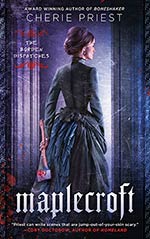
![]() Rabindranauth@DDR
Rabindranauth@DDR
9/14/2014
![]()
I think one of the worst experiences a reader can have is to see a book with all the elements they like, but have it carried out in an entirely unsatisfactory manner. It's like being a kid and watching your best friend buying a tub of your favorite ice cream, only to use it to grease the chains of his tricycle before riding off into the sunset. That's what Maplecroft was like for me.
It's been two years since Lizzie Borden took that ax to her father and his wife, inspiring school yard jump rope songs all across America. Caring for her invalid sister Emma, she spends her time delving into the science of the ancients and using her ax against the humanoid monstrosities that wander onto the lawns of Maplecroft from time to time. But when the mysterious, eldritch illness that claimed her parents awakens in the town, the illness that led her to using that ax on them in the first place, Lizzie's in for some troubling times. Mother is coming.
So, there's a lot going on in this book that I enjoyed. One of my biggest fears about this novel going into it is that an interesting concept would be completely thrown out the window in favor for a paranormal romance set up, and I'm happy Cherie Priest disappointed me on that front. Instead, she presents a Gothic, Lovecraftian horror tale based off of one of America's most infamous unsolved murders, and the woman at the center of the affair, Lizzie Borden.
I liked the way the story is laid out, with multiple viewpoints all told in an epistolary form, usually in the form of private journal entries for everyone, or correspondences. However, this also backfired on me. For though it presents an interesting narration style along the lines of one of my all time favorites, Dracula, it falls prey to what I like to think of Character Retrospection Syndrome. Large swaths of the book are broken up by choppy narrations, or characters going off on tangents pondering how events affect them, or on some other pointless side path, precisely mimicking the meandering thoughts of your average person. An interesting spin, and one that should logically make the characters more easily related to as real people, I think, but one that immensely bored me and did so for the vast majority of the novel.
My major reason for not completely abandoning the story was the Lovecraftian element, which I felt was handled both excellently and infuriatingly. Excellently because there are parts that completely scared the crap out of me. Namely, the scene with Matthew Hamilton when his godfather Ebenezer relates what he saw when he entered the room Matthew was tied up in. Cherie Priest pays excellent homage to Lovecraft in the book. However, it was also handled in a very infuriating manner because she clearly holds a lot back, only giving us a vague idea of what we're facing by the end of the book. Considering this book was sold with the clear implication it was the first of a series, I expected this on one level, but at the same time I didn't expect such an utter tight-fisted handling where it comes to that element of the story.
And then there are the characters. Maybe it's due to the way the narration is carried out, but I found the women largely inseparable from each other in terms of personality, and the men almost the same. As a result, I never really connected with anyone, and the only character of the handful that I felt vaguely interested in by the end of the tale was Dr. Owen Seabury, who gradually began to lose his grip on sanity over the course of the novel. The novel is advertised as being Gothic, and for me, his storyline and the historical setting are the only two elements that made it feel Gothic.
But most irksome of all was how the plot was handled. As the story begins, a laundry list of questions are raised, and as it progresses, more are piled on, with almost no respite. Cherie Priest rapidly cycles through a handful of viewpoints, some of which felt at times that they held no import to the tale, but which proves false towards the latter quarter of the book. I could have enjoyed the high amounts of mystery used over the course of story, but unfortunately the time I hoped would be spent dedicated to the elements of the story, such as the Lovecraftian beast, the eldritch illness, the devolution of Dr. Philip Zollicoffer, was instead spent on exploring the characters, the relationships that bind them together, and the mysterious past of Lizzie Borden.
For some folks, the character exploration won't be a problem, but considering I never really connected with them, this proved a major hobble in the long run. For the most part, I felt that this character exploration was little more than a way to pad the book out, and save the juicy parts of her book, the parts highly marketed to readers for her later instalments, which I'm sure will be numerous, based on how little is touched on in the grand scheme of things in this book.
What it all boils down to is that Maplecroft is a book containing everything I like, in theory, but which just doesn't deliver in practice. It very much reads like the opening to a series, and though it's of a style and atmosphere that will easily draw in numerous readers, in the long run it proved more an ordeal than a source of enjoyment for me. I'm probably going to pass on the sequel to the Borden Dispatches, but I definitely intend to pick up more Cherie Priest in the future, because her skill is clear in the parts of the book that I did enjoy.
http://drunkendragonreviews.wordpress.com/